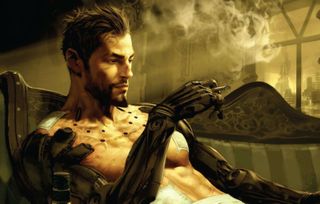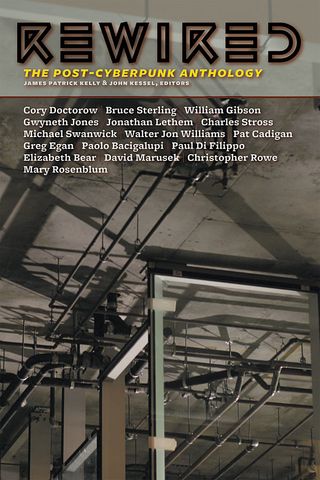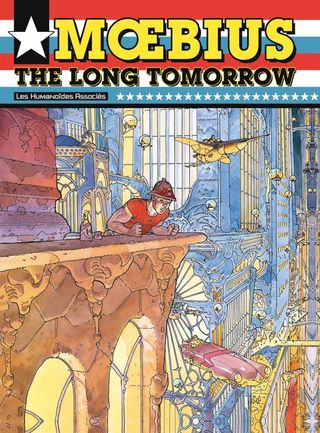If you like Deus Ex you’ll also like…
Still obsessed with gaming's ultimate cyber noir? These books, movies and more will be relevant to your interests.

Fear. Paranoia. Uncertainty. In both the original Deus Ex and in its excellent 2011 reimagining, Deus Ex: Human Revolution, freeform gameplay systems let the player make tough moral choices in the troubled, surveillance-heavy world of the near-ish future. That’s one reason why the 2000 edition of the game routinely tops the best-of-all-time lists. But, for me, the core appeal of the original Deus Ex as well as Human Revolution has always been their near-perfect take on cyberpunk.
In a genre that’s sometimes been written off as stale, repetitive, and even kitsch (remember Johnny Mnemonic?), Deus Ex has always stood out. I’d put it right up there with genre monuments like William Gibson’s Neuromancer, Ridley Scott’s Blade Runner, and Katsuhiro Otomo’s Akira.
In this entry of ‘If you like …’, I’ve again tried to pick out some works from other forms of entertainment and culture that capture a similar aesthetic to Deus Ex, or which pivot off from the main themes—future dystopias, body modification, and dark conspiracies. All the good stuff, essentially.
Cypher, directed by Vincenzo Natali
Released in 2002, Cypher plays with familiar cyberpunk themes, but also features an unsettling visual style that pairs nicely with its tale of corporate espionage. In it, we come to know Morgan Sullivan, an unemployed accountant who finds himself caught up in a bizarre, information-age identity crisis.
The film succeeds at exploring the psychological chaos that technology so often brings to the surface in the men and women who want to profit from it. What are we prepared to believe about the real forces at work in the world, and about ourselves?
Rewired: The Post-Cyberpunk Anthology, edited by James Patrick Kelly and John Kessel

Rewired: The Post-Cyberpunk Anthology
Kelly and Kessel’s 2007 anthology shines a light on what cyberpunk still has left to explore in the 21st century. If Deus Ex represents one of the best examples of cyberpunk done right, Rewired wants to find out where it might go next. While it includes stories by giants of the genre such as William Gibson and Bruce Sterling, one of its best entries is the editors’ own introduction. In it they lay out what is essentially a post-mortem looking at what succeeded—and didn’t—about cyberpunk, both in the literature as well as the “movement” that sprung up around it.
The short stories like Sterling’s “Bicycle Repairman” often search for an idea of what post-cyberpunk means by turning a cliché—such as shadowy secret agents—on its head. Scattered throughout the volume you’ll also find excerpts from a fascinating series of letters exchanged between Sterling and Kessel during the ‘80s where they try to work out the meaning and significance of cyberpunk, and science fiction more generally.
PC Gamer Newsletter
Sign up to get the best content of the week, and great gaming deals, as picked by the editors.
eXistenZ, directed by David Cronenberg
Body modification, whether through nanomachines or high-performance prosthetic limbs, is one way Deus Ex grounds itself in a future that feels strangely familiar. In his 1999 film, which was itself almost a spiritual sequel to Videodrome, Cronenberg offers up what I think is a unique—and more biological—interpretation of corporate intrigue and technological advancement.
Cronenberg’s career has often explored themes of body horror and violence, and here he weaves a challenging story of videogames, virtual worlds, and the nature of reality. It’s a strange, and often disturbing, film. (Unless of course you’re cool with a gun that shoots human teeth being constructed from a Chinese meal). But eXistenZ also resists easy answers to the questions it poses about what we’re looking for when we play games.
The Long Tomorrow, written by Dan O’Bannon, illustrated by Moebius

This short comic casts a long shadow over much of what we now expect to see in sci-fi noir and darker visions of future urban life. The buildings are tall and the streets are dirty, crowded, and chaotic.
First published in 1975, the comic originated as a collaboration between Alien writer Dan O’Bannon and the French artist Jean Giraud, aka Moebius. The two began work on The Long Tomorrow after they met and collaborated on the never-finished production of Dune by the filmmaker Alejandro Jodorowsky.
For more on the intersection of Moebius, sci-fi, and cyberpunk, check out this BBC documentary on the artist, In Search of Moebius.
Net Cafe Refugees, directed by Shiho Fukada
Fukada’s documentary doesn’t make for easy viewing. But its unflinching honesty about the way modern life can so easily cast aside human beings is a reminder that in many corners of the world, the dystopia has already arrived. The 10-minute film gives us a deeply personal look at the lives of two men who’ve found themselves living in Japan’s 24-hour internet cafes.
Each man’s story is unique, but they share an identity that’s been profoundly shaped by the intersection of technology, economic turbulence, and social isolation. If Deus Ex asks us to consider how the future will alter what it means to be human, then Fukada’s work demands we look at how our present has already changed us.
For more instalments of ‘If you like...’, check out the other games covered in this series below:
- If you like Metal Gear Solid 5
- If you like Dead Space
- If you like The Witcher
- If you like Dishonored
- If you like Mass Effect
- If you like Skyrim
- If you like Fallout 3
- If you like Tom Clancy's The Division
- If you like Company of Heroes
- If you like STALKER
- If you like Her Story
- If you like American Truck Simulator
- If you like Rainbow Six Siege
- If you like Far Cry Primal
Most Popular

